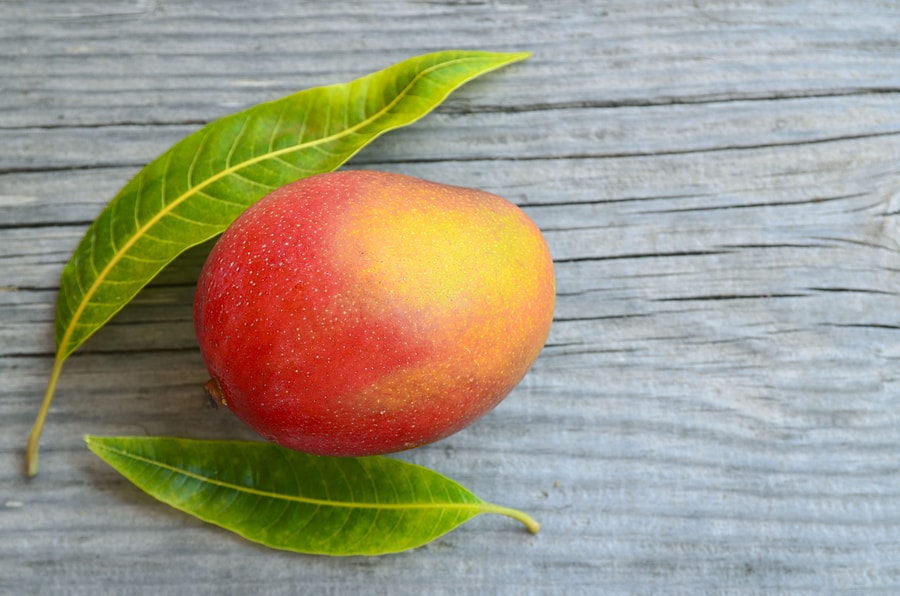
African mango is a tree native to West Africa. It is widely touted for its weight-loss and fat-burning effects, but extracts of various parts of this tree may also have antioxidant properties, lower cholesterol, and reduce blood sugar. Read more to learn about all the potential health benefits of African mango.
What Is African Mango?
African mango (Irvingia gabonensis) is a tree found in the rainforests of West Africa. Fruits of this tree are protein-rich and resemble mangoes, hence the name. It is also known as wild mango, bush mango, dika, and ogbono [1].
All parts of the African mango tree are used for a variety of purposes [2]:
- The fleshy part and pulp of the fruit is consumed as food or used to make jams, juice, and wine.
- The seeds are eaten raw or used to prepare different foods and supplements.
- The roots, bark, leaves, and seeds are used to make traditional medicines.
Components
The fruit of African mango provides 86 Kcal. The nutrient content per 100g fruit is [3]:
Seeds of the fruit are also a good source of nutrients. They contain a variety of vitamins and minerals including calcium, magnesium, potassium, sodium, phosphorus, and iron.
They also contain the flavonoids quercetin and kaempferol, which have antioxidant properties [4].
Mechanism
African mango seeds have high amounts of soluble fiber. Soluble fibers are “bulk-forming,” meaning that they delay the rate by which food exits the stomach, leading to a gradual absorption of sugars. This decreases the elevated blood glucose level after a meal [5].
Fibers in African mango seeds can also bind to bile salts and carry them out of the body in the stool. This increases the conversion of cholesterol into bile salts to replenish the deficiency, thereby decreasing blood cholesterol levels [5].
Additionally, African mango seed extract can suppress fat production by [6, 7]:
- Reducing the activity of the protein PPARγ, which promotes weight gain
- Increasing adiponectin, a protein hormone involved in fat breakdown and glucose control
- Reversing leptin resistance, a factor that can lead to obesity
Fruit extracts of African mango contain many compounds with antioxidant activities (free-radical scavenging) such as flavonoids, phlobatannins, alkaloids, and anthocyanins [8].
Leaf, bark, and root extracts of African mango contain antifungal and antibacterial compounds (terpenoids and ellagic acid-like compounds). These molecules exert their effects by disrupting bacterial and fungal cell membranes, preventing microbial adhesion, and inactivating microbial enzymes [9].
Health Benefits
Possibly Effective for:
Lowering Blood Sugar
Diets rich in soluble fiber can help stabilize blood sugar levels in people with insulin resistance. Since African mango seeds are high in soluble fiber, they may aid in diabetes management [5].
In a clinical trial on 12 people with metabolic syndrome, African mango extract reduced blood sugar and fat levels. It even caused metabolic syndrome remission in 58% of the patients [10].
In another study of 102 overweight volunteers, treatment with African mango seed extract decreased fasting blood glucose levels by 25% after 8 weeks [7].
All in all, limited evidence suggests that African mango may help lower blood pressure. You may discuss with your doctor if it may be helpful in your case. Importantly, never use African mango to replace antidiabetic medication prescribed by your doctor.
Insufficient Evidence for:
1) Weight Loss and Fat Burning
In a 10-week clinical trial of 120 overweight volunteers, African mango supplements significantly reduced weight, body fat (6.3% avg.) and waistline circumference (16.2% avg.) [7].
Similar effects were seen in a 4-week trial of 40 obese subjects. In this study, the African mango treated group showed an average decrease in body weight and LDL (“bad”) cholesterol levels as well as an increase in HDL (“good”) cholesterol levels [11].
Another trial of 72 people found that a combination of African mango and Cissus quadrangularis (a plant used for joint and bone health) significantly decreased body weight, body fat (20.1%) and waistline circumference compared to placebo after 10 weeks [12].
However, although some studies on African mango showed weight-loss effects, they are small and poorly designed. Larger, more robust clinical trials are needed.
Also, African mango cannot act as a sole source of weight loss. Managing your diet and lifestyle is needed to fully capitalize on its weight loss properties [13].
2) Lowering Blood Cholesterol
In a 4-week clinical trial of 40 obese individuals, African mango supplementation decreased total blood cholesterol (46%) and LDL (“bad”) cholesterol levels and increased HDL (“good”) cholesterol (47%) levels compared to placebo [5].
In a 90-day clinical trial on 12 people with metabolic syndrome, oral capsules with African mango extract reduced blood triglycerides, and VDL (“bad”) cholesterol [10].
Two small clinical trials cannot be considered sufficient evidence that African mango lowers blood cholesterol. Additional clinical trials on larger populations are required.
3) Lowering Blood Pressure
African mango supplements reduced systolic blood pressure in a clinical trial of 28 overweight people after 2 weeks. This preliminary result should be confirmed by conducting more clinical trials [5].
Animal and Cell Research (Lack of Evidence)
No clinical evidence supports the use of African mango for any of the conditions listed in this section. Below is a summary of the existing animal and cell-based research, which should guide further investigational efforts. However, the studies should not be interpreted as supportive of any health benefit.
Gut Health
African mango leaf extracts protected mice and rats from castor oil-induced diarrhea and fluid buildup in the intestines. They also decreased chemically-induced contractions in isolated rabbit and guinea pig intestines [14].
African mango extracts also inhibited ulcer formation in rats by increasing mucus production in the stomach [15].
Antioxidant
In a cell-based study, fruit extracts of African mango exhibited impressive antioxidant activity (78% free radical inhibition) [8].
Because of this, African mango may protect against heavy metal toxicity. In rats, cadmium-induced kidney toxicity was significantly reduced with the stem bark extracts of the African mango [16].
In another study, African mango leaf extracts significantly improved liver function in rats with heavy metal-induced liver toxicity [17].
Pain
Stem bark extracts of African mango stem relieved heat and pressure-induced pain in mice. Although the mechanisms are unclear, it is thought to work by activating opioid receptors, which are involved in reducing pain [18].
Antibiotic and Anti-Parasitic
Extracts of leaves, bark, and roots of the African mango significantly inhibited bacterial and fungal growth in test tubes. Leaf and root extracts exhibited the highest antimicrobial activity [19].
Leaf extracts of African mango may also have antiparasitic effects. In test tubes, leaf extracts (500mg/ml) of African mango killed up to 71% of roundworm larvae [20].
However, these are very preliminary results that haven’t been replicated in humans and even in animals. Clinical trials are needed to determine if African mango may help with the infections caused by these organisms when ingested in normal doses.
Safety and Side Effects, Limitations, Drug Interactions, Dosage
Keep in mind that the safety profile of African mango is relatively unknown, given the lack of well-designed clinical studies. The list of side effects below is not a definite one and you should consult your doctor about other potential side effects based on your health condition and possible drug or supplement interactions.
African mango supplements are generally safe. In the lab, doses as high as 2,500 mg/kg bw/day did not show any genotoxic (DNA damaging) effects [21].
Reported side effects include [13]:
- Headache
- Insomnia
- Stomach gas
Limitations and Caveats
Although some studies have shown that African mango can help with weight loss, they are small and poorly designed. Current clinical research has yet to confirm its safety and effectiveness as a weight-loss supplement [13].
Some benefits were only studied in animals or cells. They may or may not apply to humans.
Drug Interactions
Supplement/Herb/Nutrient-drug interactions can be dangerous and, in rare cases, even life-threatening. Always consult your doctor before supplementing and let them know about all drugs and supplements you are using or considering.
Since African mango may lower blood sugar levels, it should be used with caution when taken with anti-diabetic medications [22].
It may also affect the rate of absorption of prescription drugs since it delays stomach emptying [5].
Dosage
Because African mango is not approved by the FDA for any conditions, there is no official dose. Users and supplement manufacturers have established unofficial doses based on trial and error. Discuss with your doctor if African mango may be useful as a complementary strategy in your case and which dose you should take.
The fruit is consumed by locals, and the seeds are ground and used in the preparation of various foods, cosmetics, and drugs.
Seed extracts are available in the form of supplements [23].
Clinical studies have used 150 mg capsules twice a day (taken 30 minutes before meals), 250 mg capsules twice a day, and 1.05 g capsules three times a day (taken 30 minutes before meals) [24, 25, 11].
User Experiences
The opinions expressed in this section are solely those of African mango users, who may or may not have medical or scientific training. Their reviews do not represent the opinions of SelfHacked. SelfHacked does not endorse any specific product, service, or treatment.
Do not consider user experiences as medical advice. Never delay or disregard seeking professional medical advice from your doctor or other qualified healthcare providers because of something you have read on SelfHacked. We understand that reading individual, real-life experiences can be a helpful resource, but it is never a substitute for professional medical advice, diagnosis, or treatment from a qualified healthcare provider.
Users taking African mango supplements had a mixed level of satisfaction. Although many users reported satisfactory weight-loss results, a few showed discontent and reported no significant change in body weight.
A satisfied customer reported decreasing their waist circumference without making any other lifestyle changes during that time.
Users also reported an increase in defecation.


